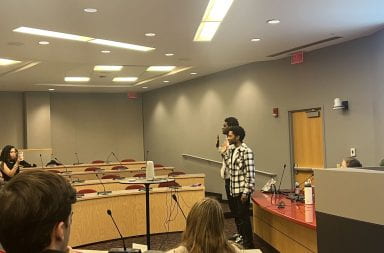
Students hold flags representing the country they’re from at Arab Student Union’s Arab Night on March 3. Credit: Momina Tashfeen | Lantern Reporter
On Sunday, the Arab Student Union hosted its annual Arab Night, an evening dedicated to the celebration of Arab countries, people and their various cultures. Dina Kawar, ambassador of Jordan to the United States, and Bilal Al Nsour of the Jordanian Consul to the U.S. attended as guests of honor.
The event consisted of a flag walk, traditional dabke performances — native Arab folk dance — classical Arabic music, fashion shows and poetry expressing the Arab experience.
Wesam Jallaq, president of ASU, opened the night by acknowledging the Arab population at Ohio State, which makes up 5 percent of all undergraduates.
“It doesn’t sound like a lot, but we have a lot of students at OSU,” Jallaq, a fourth-year in political science, said. “So that’s about 3,000 students who are identifying as Arab.”
Despite the large number of students identifying as Arab, Ohio State currently doesn’t recognize Middle Eastern and North African as an ethnic category.
“Arabs have to mark their identity at the university as either white or other,” Jallaq said.
Efforts have been put into place after they were inspired by their fellow Arabs at the University of Michigan, who advocated and lobbied the university for a resolution stating that Middle Eastern and North African (ME/NA) be an ethnic category on university documents. Michigan was the first university in America to implement this, so after its success, Ohio State Arab students followed suit, Jallaq said.
Although Undergraduate Student Government has passed a resolution that would include this category for Arabs, no such change has been made, Jallaq said.
Throughout the night, the crowd was reminded to use the hashtag #weExist as a way of making the university aware of Arab students, Waseem Naboulsi, IT Chair of ASU, said.
“The benefit of this is one, just recognition, which is very important. We get our own counselor, someone who understands specifically our struggles and can specifically advise people of the Arabs and North Africans,” Naboulsi, a third-year in biology, said. “This would open up the opportunity for scholarships specifically for Arabs.”
Another theme throughout the night was focusing on service toward the Arab community, Jallaq said.
“Ohio State has 13 student organizations that are dedicated either to an Arab cause or Arab culture organization, and as the Arab Student Union, we like to think of ourselves as the parent organization,” Jallaq said. “This year alone we had three new Arab organizations come up: The Egyptian Student Association, The Palestinian Women Association and The Arab Dental Society.”
Arab Night also shed light on the humanitarian dental aid trip members of The Arab Dental Society will take in April. They will provide free dental care and education on dental hygiene to Syrian refugees at the world’s largest Syrian refugee camp, the Al Zaatari Camp in Jordan.
Proceeds from the event will go toward Atlantic Humanitarian Relief, which will be collaborating with The Arab Dental Society to buy dental supplies in order to serve the nearly 79,000 refugees at the camp.
Naboulsi, a Syrian-American, said the issue is very close to him and that coverage of the Syrian crisis has died down.
“People have been kind of numbed to the issue,” he said. “It doesn’t really have a ring as hard anymore.”


